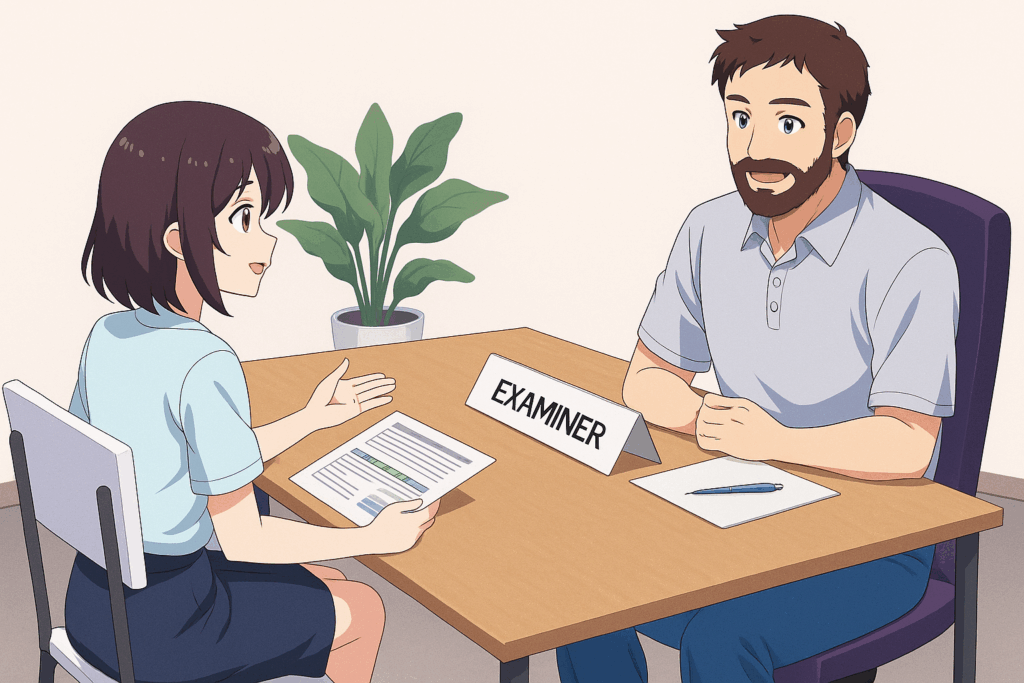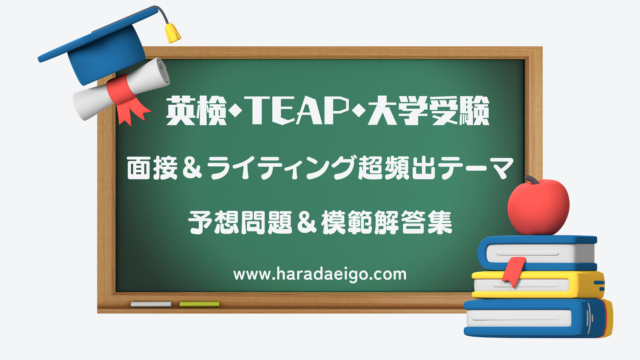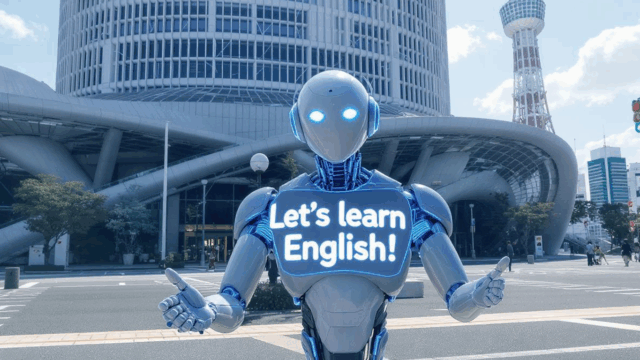英検準1級 二次面接試験完全攻略ガイド
2025年最新版
面接テクニック・万能テンプレート・目から鱗の予想問題25問と模範解答(日本語訳付き)で合格を確実にする最強対策集!
Q&A対策
予想問題25問
模範解答付き
🎯 このガイドで得られる合格力
- 面接試験の詳細な評価基準と配点システムの理解
- ナレーション(4コマ説明)で高得点を取る具体的テクニック
- Q&A(質疑応答)で論理的に答える万能フレーズ集
- 実際の面接で使える汎用表現とテンプレート
- 25問の予想問題と模範解答(英語+日本語訳)
面接試験の概要と評価基準
📝 試験概要
英検準1級の二次試験は、1対1で行われる約8分間の英語面接です。面接委員(日本人またはネイティブ)が1名担当し、まず簡単な受け答え(自由会話)でウォーミングアップを行った後、以下の流れで進行します:
- 4コマのイラストを使って約2分間のナレーション(物語説明)
- 面接官から合計4問の質問に答える
- No.1: イラストの内容に関する質問
- No.2〜4: 社会性のあるテーマについての意見問題
⚖️ 評価基準
面接では以下の観点で総合的に評価されます:
- 内容・構成: ナレーションや回答の論理性
- 発音・語彙・文法: 正確性と適切性
- 表現力: 流暢さと語法の豊富さ
- 情報の豊富さ: 具体例や詳細の提供
- アティチュード(態度): 積極性・明瞭さ・アイコンタクト
📊 配点と合格ライン
ナレーション
15点
質問No.1〜4
各5点×4 = 20点
アティチュード
3点
合格ライン
22点以上/38点
高得点取得のための面接テクニック
💪 面接全体のポイント(態度と流暢さ)
✨ 積極的な態度
たとえ完璧な表現が思いつかなくても、簡単な言葉であきらめずに伝えようとする努力が評価されます。沈黙が長く続くと減点対象になるため、なるべく途切れずに話すことを心がけます。
🗣️ 明瞭な話し方
適切な音量ではきはきと話し、アイコンタクトを取りましょう。質問に対して「I don’t know.」で諦めてしまわず、少しでも自分の考えを述べる姿勢を見せてください。
🎯 流暢さを意識
考え込んでしまったら、“Let me see…”(ええと)などのつなぎ表現で間をつなぎましょう。質問が聞き取れなかった場合は“Pardon me, could you repeat the question, please?”と丁寧に聞き返して構いません。
👋 自由会話への対応
面接の冒頭には「Please tell me about yourself.(自己紹介をお願いします)」と聞かれることが多いので、自分の職業や専攻、興味のあることなどを英語で話せるよう準備しておきましょう。
🎨 ナレーション(イラスト展開説明)のコツ
ナレーション問題は配点が高く、合否の鍵を握る重要パートです。与えられた4コマのイラストを見て、指示に従い1分で内容を考え、2分間で英語の物語として説明します。
⏰ 時系列に沿って話す
絵の展開に合わせて「One day,… / A few days later,… / However,…」など時間経過や論理を示すつなぎ言葉を使い、ストーリーに起承転結を持たせます。
📖 過去形で描写
イラストの出来事は過去の出来事として描写します。「The man decided to…」「She was talking to her friend…」のように時制を統一します。
👥 「誰が・どこで・何をした」を明確に
各コマで主語(登場人物)をはっきりさせ、関係性が推測できる場合はhis wife / her boss / their teacherなどと言い換えると良いでしょう。
💭 心理描写を加える
「happily(嬉しそうに)」「worriedly(心配そうに)」「angrily(怒って)」など副詞を用いて感情や様子を表現してみましょう。
💬 吹き出しのセリフは間接話法に
人物のセリフは直接話法のまま読むのではなく間接話法に変換しましょう(例:「I will go」→「He said that he would go」)。※ただし、無理せず直接話法でもOK!
📚 典型的なストーリー構成を意識
多くの問題カードの物語展開は「問題が発生→対策実行→一応の解決→新たな問題発生」というパターンになっています。
❓ 質疑応答(Q&A)のコツ
ナレーション後には4つの質問に答えます。質問はNo.1とNo.2〜4で性質が異なるため、それぞれ適切な対策をとりましょう。
🎯 No.1(イラスト関連)の質問
ここでは4コマ目の人物の行動や気持ちについて「もしあなたが○○ならどう思いますか?」と問われるのが定番です。
回答のコツ: 自分がその人物になったつもりで、主語を “I” にして答えます。導入として“I’d be thinking…”(私なら〜と考えるでしょう)の形で始めるとスムーズです。
🗣️ No.2〜4(意見を問う質問)
残りの3問はカードの話題に関連した社会性のある質問です。質問文の約60%は「Do you think …?」という形、約30%は「Should …?」という形です。
📝 基本構成
まずYesかNoかを明確に示し、続けて「because …」で理由を述べる構成が基本。例:「Yes, I do. Because …」
🔗 論理的な構成
回答は30〜35語程度(2〜3文)でまとめる。「First, … / Secondly, … / Also, … / Therefore, …」などを活用。
💡 内容の深さ
余裕があれば「Some people may say that… but I believe …」で反対意見に触れつつ自分の立場を述べると高評価。
⏰ 回答に困ったとき
「Well, I’ve never thought about that, but…」のように切り出して時間を稼ぎつつ考えることができます。
💬 よく使われる英語フレーズ集
面接で役立つ汎用フレーズをあらかじめ覚えておくと、咄嗟の質問にも落ち着いて対応できます。
| 英語フレーズ | 日本語の意味・用法(参考) |
|---|---|
| In my opinion, … | 私の意見では…(自分の考えを述べ始める定番表現) |
| I’d think that … | …だと思います(婉曲な”I think”表現で、控えめながら意見を述べる) |
| It is necessary to ~ | ~することが必要です(理由説明:「なぜなら~が必要だから」) |
| Some people may say that …, but I … | …と言う人もいるかもしれませんが、私は…(反対意見を紹介して自分の立場を述べる) |
| For example, … / Such as ~ | 例えば… / ~など(具体例を挙げるときの表現) |
| Therefore, … / That’s why … | だから… / そういうわけで…(結論・結果を述べる) |
| Let me see, … | ええと、…(考え込んだときのつなぎ表現) |
| Pardon me? Could you repeat the question, please? | すみません、もう一度質問を繰り返していただけますか?(質問が聞き取れなかったときの丁寧な聞き返し) |
面接予想問題25問と模範解答
📝 予想問題について
教育・環境・社会問題・テクノロジー・文化・ジェンダー・人権・労働など幅広い分野から、英検準1級の二次面接で問われそうな質問を25問ピックアップしました。それぞれの質問に対する模範解答を英語で示し、続けてその日本語訳を記載しています。
Q1
Do you think university education should be free for everyone?
🗣️ 模範解答(English)
In my opinion, university education should be free for all people. It would give everyone equal opportunities because students from any economic background could afford to attend. That’s why I believe investing public funds in education is worthwhile.
🇯🇵 模範解答(日本語訳)
私の意見では、大学教育はすべての人に無償で提供されるべきです。経済的背景に関係なく誰もが進学できるようになり、平等な機会を与えられるからです。そのため、教育に公的資金を投じる価値は十分にあると信じます。
Q2
Do you think children should start learning a foreign language at an earlier age?
🗣️ 模範解答(English)
Yes, I do. Young children have a great ability to absorb new languages, so starting early makes it easier for them to become fluent. For example, many kids who begin English in elementary school develop better pronunciation than those who start later.
🇯🇵 模範解答(日本語訳)
はい、そう思います。小さい子どもには新しい言語を吸収する優れた能力があるので、早く始めるほど流暢に話せるようになります。例えば、小学校で英語を始めた多くの子は、後になってから始めた子よりも発音が上手になります。
Q3
Should schools teach more practical life skills instead of just academic subjects?
🗣️ 模範解答(English)
Yes. I think schools should include more practical life skills in their curriculum. Academic knowledge is important, but students also need skills like managing money or communication, which help in real life. Therefore, a balance of practical and academic learning is necessary.
🇯🇵 模範解答(日本語訳)
はい。学校は純粋な学問科目だけでなくもっと実用的な生活スキルもカリキュラムに含めるべきだと思います。学問的知識も大切ですが、お金の管理やコミュニケーションのような実生活で役立つスキルも生徒には必要です。したがって、実用的な学びと学問的な学びのバランスが必要です。
Q4
Should governments enforce stricter laws to protect the environment?
🗣️ 模範解答(English)
Yes, I believe stronger environmental laws are necessary. Strict regulations would reduce pollution by holding companies accountable. For instance, if factories must cut emissions by law, they will invest in cleaner technology. That’s why tougher laws can lead to a healthier environment.
🇯🇵 模範解答(日本語訳)
はい、環境保護のためにはより厳しい法律が必要だと考えます。厳格な規制によって企業に責任を負わせることで汚染を減らせるでしょう。例えば、法律で工場に排出削減を義務付ければ、工場側もクリーンな技術への投資を行うはずです。こうした理由から、より厳しい法律がより健全な環境につながると考えます。
Q5
Do you think individual efforts can effectively help combat climate change?
🗣️ 模範解答(English)
I do think individual efforts make a difference. If many people each save energy and reduce waste, the combined effect is significant. Also, individual actions can influence government and businesses by showing that the public cares about climate issues.
🇯🇵 模範解答(日本語訳)
個人の取り組みも気候変動との戦いに効果を発揮すると私は思います。一人ひとりが省エネやゴミ削減を実践すれば、その積み重ねによる効果は大きいです。また、気候問題に対する世間の関心を示すことで、個々の行動が政府や企業に影響を与えることもできます。
Q6
Is it possible to balance economic growth with environmental protection?
🗣️ 模範解答(English)
Yes, I believe a balance is possible. Technological innovation can allow industries to grow while reducing pollution — for example, renewable energy creates jobs and protects the environment at the same time. With smart policies, we can have both a strong economy and a healthy environment.
🇯🇵 模範解答(日本語訳)
はい、両立は可能だと信じます。技術革新によって産業を成長させつつ汚染を減らすことができます。例えば、再生可能エネルギーは雇用を生み出しつつ環境も守ります。賢明な政策があれば、強い経済と健全な環境の両方を実現できるでしょう。
Q7
Do you think the aging population will have a serious impact on society?
🗣️ 模範解答(English)
Yes. An aging population will seriously affect society. There will be fewer working-age people, which can lead to labor shortages and economic slowdown. Also, healthcare and pension systems will be under pressure as more elderly people require support.
🇯🇵 模範解答(日本語訳)
はい、高齢化は社会に深刻な影響を及ぼすと思います。働き手の世代が減り、人手不足や経済の停滞につながりかねません。また、高齢者が増えることで医療や年金制度にも大きな負担がかかるでしょう。
Q8
Should governments do more to reduce the gap between rich and poor?
🗣️ 模範解答(English)
Absolutely. I think governments should take stronger action to close the wealth gap. For example, they could implement fairer tax policies and improve access to education and jobs for low-income people. Reducing inequality leads to a more stable and harmonious society.
🇯🇵 模範解答(日本語訳)
もちろんです。政府は貧富の差を縮めるためにより積極的な対策を講じるべきだと思います。例えば、より公平な税制を実施したり、低所得者層に教育や職の機会を提供したりすることが考えられます。不平等を是正することは、より安定し調和の取れた社会につながります。
Q9
Do you think people today are less connected to their communities than in the past?
🗣️ 模範解答(English)
Yes, in general I feel people are less connected nowadays. In the past, neighbors knew each other well, but today many people are busy and interact more online than in person. As a result, the sense of community isn’t as strong as it used to be.
🇯🇵 模範解答(日本語訳)
はい、一般的に現代の人々は昔より地域社会とのつながりが希薄になっていると感じます。以前は近所同士の付き合いが密接でしたが、今では多くの人が忙しく、直接会うよりネット上で交流することが増えました。その結果、かつてほど地域の一体感は強くなくなっています。
Q10
Should countries accept more immigrants to address labor shortages and population decline?
🗣️ 模範解答(English)
Yes, accepting more immigrants can help solve these issues. Immigrants can fill job vacancies in industries suffering labor shortages. Furthermore, they can contribute to the economy and make society more diverse. Proper support and integration policies would be important for success.
🇯🇵 模範解答(日本語訳)
はい、労働力不足や人口減少への対策として移民の受け入れ拡大は役立つと思います。移民の方々は、人手不足に悩む産業分野で欠員を補ってくれるでしょう。さらに経済に貢献し、社会の多様性も高めてくれます。受け入れを成功させるには適切な支援と統合政策が重要になるでしょう。
Q11
Do you think technology is making people’s lives better overall?
🗣️ 模範解答(English)
Yes, overall it is. Technology has made life more convenient — for instance, we can access information or contact someone instantly via the internet. It also helps in areas like healthcare. However, we should be careful to manage issues like overreliance on gadgets, but on the whole technology improves our quality of life.
🇯🇵 模範解答(日本語訳)
はい、全体的にはより良くしていると思います。技術のおかげで生活は非常に便利になりました。例えばインターネットで瞬時に情報へアクセスしたり人と連絡を取ったりできますし、医療などの分野でも役立っています。ただ、機器への依存などの問題には注意すべきですが、概して技術は私たちの生活の質を向上させています。
Q12
Should robots or AI be used to take care of elderly people?
🗣️ 模範解答(English)
I think robots and AI can be helpful in elder care to some extent. They could assist with tasks like monitoring health or providing reminders for medicine. On the other hand, they cannot replace human warmth and emotional support, so a combination of technology and human caregivers is best.
🇯🇵 模範解答(日本語訳)
私はロボットやAIはある程度、高齢者のケアに役立ちうると考えます。健康の見守りや投薬のリマインドといった作業を手伝ってくれるでしょう。その一方で、人間の温かみや心の支えは機械には代替できないので、テクノロジーと人間の介護者を組み合わせるのが最良だと思います。
Q13
Do you think the heavy use of smartphones is harming face-to-face communication?
🗣️ 模範解答(English)
Yes, I do. These days, people often look at their phones instead of talking to those next to them. For example, family members might sit in the same room but be busy on social media. This habit reduces direct conversation and can weaken our face-to-face communication skills.
🇯🇵 模範解答(日本語訳)
はい、その通りだと思います。最近では、隣にいる人と話す代わりにスマホを見ていることがよくあります。例えば、家族が同じ部屋にいてもそれぞれソーシャルメディアに夢中になっていることがあります。この習慣は直接の会話を減らし、対面でのコミュニケーション能力を弱める可能性があります。
Q14
Do you think globalization is harming local cultures?
🗣️ 模範解答(English)
It can be, yes. While globalization brings many benefits, it also tends to spread a homogenized global culture. Local traditions, languages, or arts can fade when people, especially young generations, adopt more globalized lifestyles. We need to preserve cultural heritage actively to counter this effect.
🇯🇵 模範解答(日本語訳)
その面はあると思います。グローバル化には多くの利点がありますが、同時に画一化された世界共通の文化も広がりがちです。とりわけ若い世代がよりグローバル化した生活様式を受け入れると、地域の伝統や言語、芸術が廃れてしまうことがあります。この影響に対抗するためにも、文化遺産を積極的に保存していく必要があります。
Q15
Should schools or parents teach children more about traditional culture and history?
🗣️ 模範解答(English)
Yes, definitely. It’s important for children to understand their roots. Learning about traditional culture and history helps them take pride in their heritage and respect their identity. Parents and schools should work together to give kids more exposure to cultural traditions.
🇯🇵 模範解答(日本語訳)
はい、ぜひそうすべきです。子どもたちが自分たちのルーツを理解することは重要です。伝統文化や歴史を学ぶことで、自分たちの遺産に誇りを持ち、自らのアイデンティティを尊重できるようになります。親と学校が協力して、子どもたちが文化的伝統に触れる機会をもっと与えるべきです。
Q16
Is it important to preserve minority languages and cultures around the world?
🗣️ 模範解答(English)
Yes, it is very important. Each language and culture holds unique knowledge and values. If we lose them, the world loses diversity. Preserving minority languages and cultures helps maintain our global heritage and teaches us to respect different ways of life.
🇯🇵 模範解答(日本語訳)
はい、とても重要です。それぞれの言語や文化には独自の知識や価値観が宿っています。もしそれらを失えば、世界は多様性を失ってしまいます。少数言語や文化を保存することは、人類全体の遺産を守ることであり、異なる生き方を尊重することにもつながります。
Q17
Do you think society has achieved true gender equality?
🗣️ 模範解答(English)
No, not yet. Society has made progress, but true gender equality is still a work in progress. For example, women on average earn less than men in many places, and there are fewer women in leadership positions. We need continued efforts to close these gaps.
🇯🇵 模範解答(日本語訳)
いいえ、まだだと思います。社会は以前より進歩しましたが、真の男女平等はまだ途上です。例えば、多くの地域で女性の平均給与は男性より低いですし、指導的地位に就く女性も少ないです。これらの格差を埋めるには今後も努力が必要です。
Q18
Should housework and childcare be shared equally between men and women?
🗣️ 模範解答(English)
Yes, definitely. Both men and women work and contribute to the family, so it’s fair to share household chores and childcare. When responsibilities at home are divided equally, it reduces stress on both parents and promotes mutual respect in the family.
🇯🇵 模範解答(日本語訳)
はい、ぜひそうすべきです。男女ともに働いて家庭を支えているのですから、家事や育児は平等に分担するのが公正です。家庭での責任を平等に分け合えば、両親双方のストレスが減り、家族内の相互尊重も高まります。
Q19
Should companies be required to have more women in leadership positions?
🗣️ 模範解答(English)
Yes. Companies should promote more women to leadership roles. Diverse leadership leads to better decision-making and innovation. Some people may argue that hiring should be only merit-based, but I think setting targets or requirements for female leaders can help correct long-standing imbalances.
🇯🇵 模範解答(日本語訳)
はい。企業はもっと多くの女性を指導的地位に登用すべきです。多様なリーダーシップは、より良い意思決定やイノベーションにつながります。採用や昇進は能力のみに基づくべきだという人もいるかもしれませんが、女性リーダーの比率に目標や要件を設けることは、長年の不均衡を是正する一助になると私は考えます。
Q20
Do you think the death penalty should be abolished?
🗣️ 模範解答(English)
Yes, I do. I believe the death penalty should be abolished because there’s always a risk of executing an innocent person. Life imprisonment is an alternative that punishes severe crimes without taking a life. Moreover, some studies show that the death penalty doesn’t effectively deter crime.
🇯🇵 模範解答(日本語訳)
はい、死刑は廃止されるべきだと考えます。無実の人を処刑してしまうリスクが常にあるからです。仮に極刑が必要な犯罪でも、命を奪わずに終身刑で罰する方法があります。加えて、死刑が犯罪抑止に有効ではないという研究結果もあるのです。
Q21
Should freedom of speech be restricted to prevent the spread of hate or misinformation?
🗣️ 模範解答(English)
I think some limits are necessary. Freedom of speech is fundamental, but when speech actively spreads hate or dangerous misinformation, it can harm people. For instance, hate speech can lead to real-world violence. Therefore, a certain degree of restriction or moderation is justified to protect society, while still respecting basic free speech.
🇯🇵 模範解答(日本語訳)
ある程度の制限は必要だと思います。言論の自由は基本的な権利ですが、憎悪や有害な誤情報を広める発言は人々に害を及ぼし得ます。例えばヘイトスピーチが現実の暴力につながることもあります。したがって、基本的な表現の自由は尊重しつつも、社会を守るために一定の制限やモデレーションが正当化されると考えます。
Q22
Is protecting personal privacy more important than national security?
🗣️ 模範解答(English)
In my view, privacy is extremely important, but it doesn’t have to conflict with security. We shouldn’t sacrifice personal privacy completely in the name of national security. The government must find a balance — for example, use security measures that target threats without violating ordinary people’s rights. Protecting privacy preserves freedom in society.
🇯🇵 模範解答(日本語訳)
私の考えでは、個人のプライバシーは極めて重要ですが、国家の安全保障と必ずしも衝突するものではありません。国家安全保障の名の下に個人のプライバシーを完全に犠牲にすべきではありません。政府はバランスを見いだすべきです。例えば、一般の人々の権利を侵害することなく脅威に対処できる安全対策を講じるなどです。プライバシーを守ることは社会の自由を守ることにもなります。
Q23
Should companies adopt a four-day workweek to improve work-life balance?
🗣️ 模範解答(English)
Yes, a four-day workweek could improve work-life balance. With an extra day off, employees have more time to rest or be with family, which can reduce stress and burnout. Trials in some companies have shown that productivity doesn’t drop with a shorter week, so it might benefit both workers and employers.
🇯🇵 模範解答(日本語訳)
はい、週休3日の4日間労働制はワークライフバランスの改善につながると思います。余分な休日があれば従業員は休養や家族と過ごす時間が増え、ストレスや燃え尽きの軽減になります。一部の企業での試験導入では、労働日を減らしても生産性が低下しないことが示されていますので、労働者にも雇用主にも有益かもしれません。
Q24
Should the retirement age be raised as people live longer and healthier lives?
🗣️ 模範解答(English)
Probably yes. Since people are living longer and staying healthy in older age, it makes sense to gradually raise the retirement age. This would ease the burden on pension systems and allow experienced older workers to continue contributing. However, it should be done flexibly, considering individual health and job type.
🇯🇵 模範解答(日本語訳)
おそらく引き上げるべきでしょう。人々の寿命が延び高齢になっても元気に過ごせるようになってきたので、定年を段階的に引き上げるのは理にかなっています。こうすることで年金制度の負担が和らぎ、経験豊かな高齢労働者が引き続き社会に貢献できるようになります。ただし、人それぞれの健康状態や仕事の種類も考慮して柔軟に進める必要があります。
Q25
Should rich countries do more to help poor countries develop?
🗣️ 模範解答(English)
Yes, they should. Wealthy countries have the resources to assist poorer nations, for example by providing technology or financial aid. Helping poor countries develop not only improves living conditions there but also creates a more stable and prosperous world for everyone. In short, it’s in everyone’s interest to reduce the global wealth gap.
🇯🇵 模範解答(日本語訳)
はい、裕福な国々はもっと貧しい国の発展を支援すべきです。豊かな国々は技術供与や資金援助などで貧しい国々を助けるだけの資源を持っています。貧しい国が発展すればその国の生活水準が向上するだけでなく、世界全体がより安定し豊かになります。要するに、世界的な富の格差を縮めることは皆の利益になるのです。
🎓 合格への道筋
以上の模範解答を参考に、ご自身の言葉でも意見をまとめてみましょう!練習を重ねることで、英検準1級二次面接で論理的かつ流暢に答えられる力が身についていきます。
これら25問の予想問題と解答テンプレートをマスターすれば、本番でどんな質問が来ても自信を持って対応できるはずです。健闘を祈ります!






